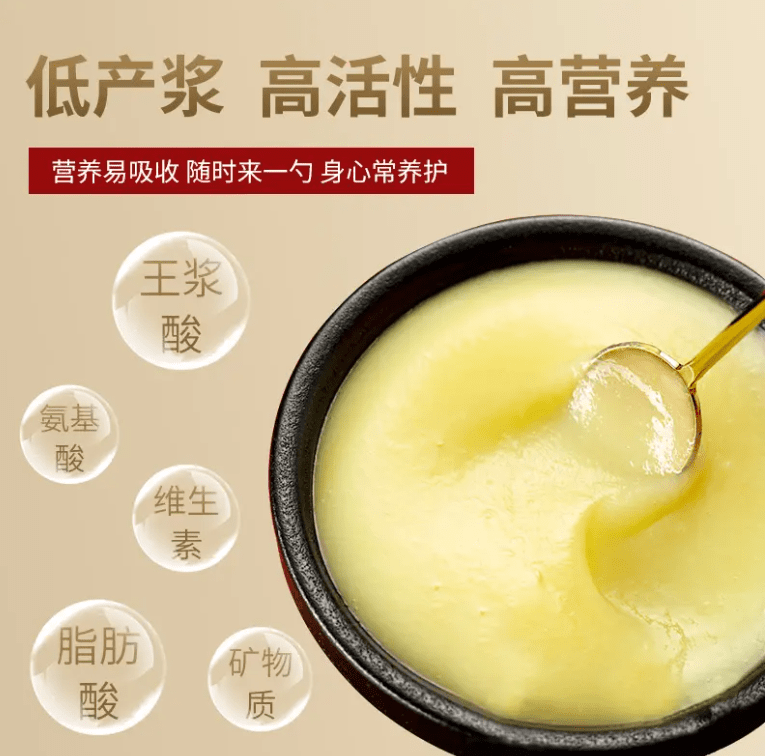For people who are prone to colds and coughs, dietary adjustments and nutritional supplementation have always been their focus of attention. Among the numerous natural health products, royal jelly has attracted widespread attention due to its unique nutritional components and potential health benefits. So, are people prone to colds and coughs suitable for consuming royal jelly? Can royal jelly be consumed during a cold? This article will delve into the nutritional components of royal jelly, its health benefits, and dietary adjustments during a cold in detail.
I. Nutritional Components and Health Benefits of Royal Jelly
Royal jelly is a secretion from the pharyngeal glands of young worker bees in beehives. It is the food provided to larvae that are about to become queens and also the lifelong food of the queen bee. Royal jelly contains rich proteins, amino acids, vitamins, minerals, and various bioactive substances such as royalactin and acetylcholine. These components endow royal jelly with various health benefits, such as boosting immunity, promoting growth and development, and delaying aging.
1. Boosting Immunity: Royal jelly’s royalactin has significant antibacterial and antiviral effects, which can enhance the body’s immunity and increase resistance to diseases. For people prone to colds and coughs, moderate consumption of royal jelly can help strengthen the respiratory mucosa’s resistance and reduce the incidence of colds.
2. Promoting Growth and Development: Proteins, amino acids, and other nutrients in royal jelly play an important role in the growth and development of the human body. Moderate consumption of royal jelly can help promote metabolism, enhance physique, and improve the body’s resistance.
3. Delaying Aging: Various bioactive substances in royal jelly have antioxidant and anti-aging effects, can clear free radicals in the body, and delay the aging process. For middle-aged and elderly people prone to colds and coughs, moderate consumption of royal jelly can help delay aging and improve quality of life.
II. Dietary Adjustments During a Cold and Consumption of Royal Jelly
A cold is a common respiratory disease, mainly manifested by symptoms such as nasal congestion, runny nose, and cough. During a cold, reasonable dietary adjustments are of great significance for relieving symptoms and promoting recovery. So, can royal jelly be consumed during a cold?
1. Moderate consumption of royal jelly during a cold: Royal jelly has the effect of boosting immunity, and moderate consumption can help alleviate cold symptoms and promote recovery. However, it is important to note that royal jelly is not a treatment for colds and cannot replace medication treatment. During a cold, patients should follow medical advice for medication treatment, along with reasonable dietary adjustments.
2. Precautions for consuming royal jelly during a cold:
* Moderate consumption: Although royal jelly is nutritionally rich, excessive consumption may lead to gastrointestinal discomfort and other adverse reactions. Therefore, when consuming royal jelly during a cold, the intake should be controlled to avoid overconsumption.
* Caution for those with allergies: Royal jelly contains various bioactive substances that may cause allergic reactions. For individuals with allergies, allergy testing should be done before consuming royal jelly, and consumption should be discontinued if allergic reactions occur.
* Pay attention to drug interactions: During a cold, patients may need to take multiple medications. Royal jelly may interact with certain medications, affecting their efficacy. Therefore, patients should consult a doctor or pharmacist when consuming royal jelly, understand the drug interactions, and avoid adverse effects.
III. Summary and Recommendations
In conclusion, people prone to colds and coughs can consume royal jelly in moderation to boost immunity and promote recovery. During a cold, patients can also consume royal jelly moderately to alleviate symptoms and promote recovery. However, it is important to note that royal jelly is not a treatment for colds and cannot replace medication treatment. When consuming royal jelly, patients should control their intake and pay attention to issues such as allergic reactions and drug interactions. In addition, maintaining good lifestyle habits and dietary habits is also an important measure to prevent colds. Through reasonable dietary adjustments and nutritional supplementation, we can better protect our health.


